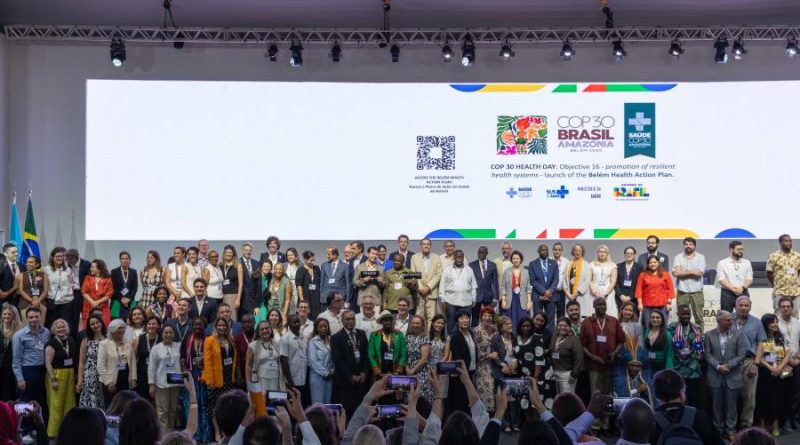COP30 Elevates Climate-Health Action with KSh 38.9 Billion Pledge and Health Plan
By Chemtai Kirui || Kass Digital
BELÉM, Brazil, Nov 17 — Countries attending the United Nations Framework Convention on Climate Change (UNFCCC) COP30 climate summit have endorsed a new global plan to protect health systems from climate impacts, as philanthropies pledged KSh 38.9 billion (US$300 million) to support early implementation efforts.
The Belém Health Action Plan (BHAP), unveiled by Brazil on Nov. 13 during COP30’s “Health Day,” sets out a framework for governments to strengthen disease surveillance, upgrade infrastructure, and respond to rising climate-linked health risks.
The plan is structured around three pillars: monitoring climate-sensitive health risks, evidence-based policy and capacity building, and innovation through digital health and research. Equity, climate justice, and participatory governance underpin its design.
The funding comes from the Climate and Health Funders Coalition, a consortium of more than 35 global philanthropic organizations, including the Rockefeller Foundation, Wellcome Trust, Gates Foundation, and IKEA Foundation.
According to COP30 organizers, the BHAP has been endorsed by 80 partners, including 30 governments, civil society groups, and international organizations. Kenya and Zimbabwe are among the African countries to signal support.
Developed by the World Health Organization (WHO), the UN University, and Brazil’s government, the BHAP was launched to place health at the centre of climate adaptation.
It prioritizes building climate-resilient health systems, mobilizing finance and technology for adaptation, and ensuring communities have a voice in governance.
“The climate crisis is a health crisis — not in the distant future, but here and now,” WHO Director-General Tedros Adhanom Ghebreyesus said during a high-level health ministerial event. “There can’t be healthy people on a sick planet.”
The Pan American Health Organization (PAHO) highlighted that 67% of health facilities in the Americas are exposed to climate hazards.
Philanthropic institutions have pledged funding to implement pilot projects, but experts warn that far more sustained investment will be required to translate the BHAP into measurable outcomes on the ground.
A special WHO-Brazil-UN report released at COP30 notes that rising global temperatures and system shocks are already affecting health infrastructure, estimating over 540,000 deaths annually from extreme heat alone, with climate-related stresses threatening hospitals and frontline services.
The BHAP will be implemented in partnership with the Alliance for Transformative Action on Climate and Health (ATACH), a WHO-backed initiative supporting innovation, systems strengthening, and cross-border learning.
For many COP30 participants, the launch represents a shift from treating health adaptation as a peripheral concern to placing it at the center of climate policy.
East African countries, including Kenya, face increasing climate-related health risks such as extreme heat, rising vector-borne diseases, and pressure on already strained health systems.
The BHAP provides a framework for governments in the region to strengthen disease surveillance, attract adaptation financing, and upgrade health infrastructure to withstand climate shocks.
Experts caution that the KSh 38.9 billion (US$300 million) philanthropic pledge is only a starting point. WHO notes that health receives a small share of global climate adaptation funding, meaning African countries will require sustained investment to convert the plan into real improvements for vulnerable communities.
Institutional capacity and government commitment will be critical for successful implementation, alongside long-term donor support.




